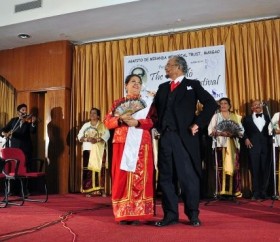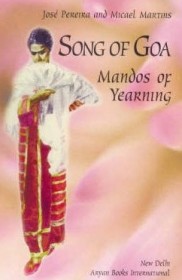Goan mandos: Sagas linked to their soul-stirring lyrics
 After the brief introduction to some of the major Goan mando composers in my last post, it’s time to move on to the lyrics of their superb compositions. I’m sure you’ll agree that the ingredients required for creating a memorable song are good music and good lyrics. And our mando composers have walked that line with distinction. They’ve given us timeless melodies whose magic is further enhanced by poignant lyrics. Lyrics that tug at our heart-strings, words that have the power to make generations of Goans want to listen to these mandos over and over again.
After the brief introduction to some of the major Goan mando composers in my last post, it’s time to move on to the lyrics of their superb compositions. I’m sure you’ll agree that the ingredients required for creating a memorable song are good music and good lyrics. And our mando composers have walked that line with distinction. They’ve given us timeless melodies whose magic is further enhanced by poignant lyrics. Lyrics that tug at our heart-strings, words that have the power to make generations of Goans want to listen to these mandos over and over again.
The lyrics of Goan mandos are poetic, tasteful, and uplifting. They’re not trite like, say, the lyrics of a Lady Gaga song: “I like you a lot, lot; Think you’re really hot, hot.” Or, for example, consider the words of a Bruno Mars number: “It’s a beautiful night, We’re looking for something dumb to do; Hey baby I think I wanna marry you.” Yeah, if those can be passed off as lyrics, then expressions like “Me Tarzan, you Jane,” are paragons of eloquence. I mean, it would be sacrilege to club such drivel with lines like “Surya moga poddlo, Anim chondrim re udelo; Amorecho vellu komesar re zalo, Moga khuim re tum pavolo.” (The sun has set my love, And the moon is rising; It’s already time to say the Angelus/It’s getting dark, But where are you my love?)
Most people might be aware that some of our popular dulpods (lively folk songs with a faster beat) relate a story or are based on true incidents. For example, in Undir mojea mama (O Uncle rat), the word ‘undir‘, could be a reference to Modgouncars or the people of Margao who were teasingly referred to as rats just as people from Raia were nicknamed vagh or lions and those from Chandor called rede or buffaloes, while the kittten in the song could be the Portuguese rulers, and the song itself indirectly a warning to Goans about making friends with the Portuguese rulers. Also, Farar far zatai ranantum (the sounds of a series of gunshots are echoing through the forest) recounts the revolt of the forestmen of Satari, referred to as ‘Rane’ in Konkani, against the Portuguese, while Ede ratiche pakle bonvtai khaddache (Bearded Portuguese soldiers are prowling around late at night) covertly expresses nationalist sentiments. (Or maybe it refers to the randy or umm… amorous nature of the Portuguese soldiers?) But did you know that many of our Goan mandos are also based on true incidents, some personal, and others political? So let’s check out a few.
Incidents that inspired some Goan mando compositions
 Luizinha mojea Luizinha: This melancholic mando is one of our oldest and is based on a gruesome incident that had taken place in Divar in 1854. When Captain Joaquim Garcez Palha, a mestizo (a person of mixed ancestry – Portuguese and non-Portuguese) tried to interfere with the elections in the Ilhas district (now Tiswadi taluka) of Goa, to ensure that a white candidate won instead of the one favoured by local Goans, the villagers decided to hit back. On 4th November, 1854, Joaquim had gone to Divar to drum up support for his preferred candidate after campaigning for votes in Merces. That was when a group of enraged villagers beat the hated Captain to death and dismembered his body in the Church Square of Nossa Senhora da Piedade. (The Church of Our Lady of Mercy!)
Luizinha mojea Luizinha: This melancholic mando is one of our oldest and is based on a gruesome incident that had taken place in Divar in 1854. When Captain Joaquim Garcez Palha, a mestizo (a person of mixed ancestry – Portuguese and non-Portuguese) tried to interfere with the elections in the Ilhas district (now Tiswadi taluka) of Goa, to ensure that a white candidate won instead of the one favoured by local Goans, the villagers decided to hit back. On 4th November, 1854, Joaquim had gone to Divar to drum up support for his preferred candidate after campaigning for votes in Merces. That was when a group of enraged villagers beat the hated Captain to death and dismembered his body in the Church Square of Nossa Senhora da Piedade. (The Church of Our Lady of Mercy!)
The mando begins with Joaquim bidding farewell to his wife Luizinha before going to Divar. When her husband does not return home, Luizinha makes anxious enquiries about him. On the pretext of sympathizing with her, the villagers inform her that her husband has been killed. Not just that, they sarcastically keep repeating the words her husband said to her while bidding her goodbye: “Do not weep.”
Here’s the first verse: Luizinha mojea Luizinha, Luizinha mojea moga, Merce Calafura sanu Divade vetam, Roddunaka. (Luizinha, my beloved, I am going from Merce Calafura to Divar, Do not weep.) And one of the subsequent verses goes like this: Divadechea mum tea dongrar, Zaittem assa caço; Tujea pottichem kellam masso, Luizinha, Roddunaka. (On that very hill of Divar, There is plenty of game for shooting; They have slaughtered/made mince-meat of your husband, Luizinha, Do not weep.)
Setembrache ekvisaveri: This moving Goan mando is based on a historic, tragic event in 1890 when unarmed civilians were fired at by Portuguese soldiers on the day of the Salcette municipal elections – 21st September – leading to the death of 23 people and the exile of many. The people were protesting against the attempt by the government to rig the elections. Here are some of the lyrics: Setembrache ekvisaveri, Camarachem foddlem re daru; Corneti vazoun soldad re aile, Povak marle faru. (On the 21st of September, the door of the Municipal Office was broken open; Soldiers arrived blowing bugles, And fired bullets at the people.)
Sonsar charich re disancho: As Maria Aurora Couto, author of ‘A Daughter’s Story’, puts it, “Most of these (mando) composers were unrepentant romantics.” Very true, for just look at what Luis Manuel Menezes, one of our mando greats (and a lawyer with hardly any clients), did when his lover Marianinha jilted him to marry someone else. He shot off the mando Sonsar charich re disancho (The world is ephemeral; it lasts but four days) and then belted out a heartfelt rendition of the song at the church door as his former ladylove and her husband swaggered out arm in arm after the wedding!
Adeus korcho vellu paulo: There are several stories linked to this mando. As one of them goes, Torquato de Figueiredo, another hopeless romantic and one of our greatest mando composers, also did something similar to Luis Manuel Menezes when the woman he loved ditched him for another. The heartbroken man stood resignedly in front of the Salvador do Mundo church even as her nuptials were being held inside and crooned his newly composed mando: Adeus korcho vellu Paulo, Ai mojem kalliz re fapsota. (It’s time to say goodbye, O! there’s a suffocating feeling in my heart.) According to another, Torquato created this composition on the occasion of the wedding of his friends Josefina Cruz and Ubaldino Mascarenhas.
As a fitting conclusion, here’s the link to this same Goan mando sung beautifully in Portuguese by the silver voiced Portuguese singer Maria Ana Bobone accompanied by Miguel Capucho at an event in Goa, followed by the Konkani rendition by Sonia Shirsat.
Enjoy!

Great insight Veena, I just love our Goan history. The music and heritage is a memorable part of it. Divar, being my hometown, I visited the church on the hill many a time. Divar is one of the few places in Goa where the Portuguese influence is still so well captured in the midst of its natural beauty, mainly because it is an island and not easily accessible to tourists. Ironically, Nossa Senhora da Piedade is the Church of Our Lady of Compassion (Mercy) and the villagers showed no mercy on the hated Captain.
If you want to experience the real serene village atmosphere in Goa, away from the crowds, take the ferry to Divar from Old Goa. http://en.wikipedia.org/wiki/Divar
Long Live the beauty of Divar!
Thanks for the appreciation Francis. I simply love delving into our history too!
And I haven’t visited Divar yet, but I hope to do so soon.
What a fabulous blog! I enjoyed reading your posts and am so pleased that you are spreading knowledge about Goan culture! Cheers to you~
Thanks for the pat on the back, Lorraine.
Veena, it was great to read about the stories behind the Goan Mandos.
Yeah, I wanted to share these not-so-well-known stories with Mando lovers, and I’m glad you enjoyed reading about them, Brenda.
Your writing is beautiful and so poignant Veena. Thank you for your research – it gives us the history behind the lyrics which is a treasure.
Thanks for the appreciation, Maria.
I have been trying to find out the meaning and roots of the word ‘mando’.
Mando might have predominantly had its roots in Salsete among the upper caste Catholics. The mando could have actually been songs revolting against the Portuguese but couched in the form of a ballad or a lover’s call. SA similar streak can be seen in the Dulpods, Dekhnis.
It could also have been patronized by the Goan clergy who perhaps did not like the Portuguese domination. The Mandos have a purely Goan fragrance and taste.
Telef Fernandes
Telef, most mando experts/researchers seem to be of the opinion that the word mando was derived from the word ‘mand’, the open space at which the villagers congregated for different celebrations including the performances of folk songs and dances. In his book “When the curtains rise” Andre Rafael Fernandes suggests it could have originated from the command given in Portuguese for the commencement of singing and dancing at social gatherings: Manda cantar ou dancar.
All the best for your ongoing research!
Beautiful!
Thanks for the compliment Matias.
Great insights. I always wondered how to get more of the history of Goa. I am from Choraw next to Divar Island and its bliss.
Thanks Wilfred. Glad you found the post informative. Perhaps you would also enjoy listening to a popular mando Surya Denvon Guelo (on this website) composed by a great mando composer from Ilhas – Caetano Joao Coutinho. If you know his descendants or can add further information about the composer for the benefit of other visitors to this site, you could consider leaving a comment below this mando post: http://www.veenapatwardhan.com/howasadgoanmandocomfortedgranny.html
Thanks Veena for sharing your research. Was an immense help especially the piece on the influence of church music on the Mando tradition in Goa.
AM ALSO CAPTIVATED BY YOUR CONTAGIOUS ENERGY FOR LIFE.
Thanks and regards
Jane Fernandes
Goa
You’re welcome Jane. And many thanks for the compliments!
Hope you have a lovely New Year.
I am from Divar and used to sing Luizinha as a kid. Have not heard any singer sing the song. Do you know anyone who did?
Unfortunately, I don’t, Glen. It’s a great composition with a historical link.
Thanks Veena. Take Care.
Glen
You’re most welcome, Glen. Glad you liked my post.
Where can I obtain a copy of the song luizinha sung by a goan?
Sorry, I can’t help you out here, Glen. But I doubt there’s any recorded version of this old mando. Who knows, I just might do it myself, some day!